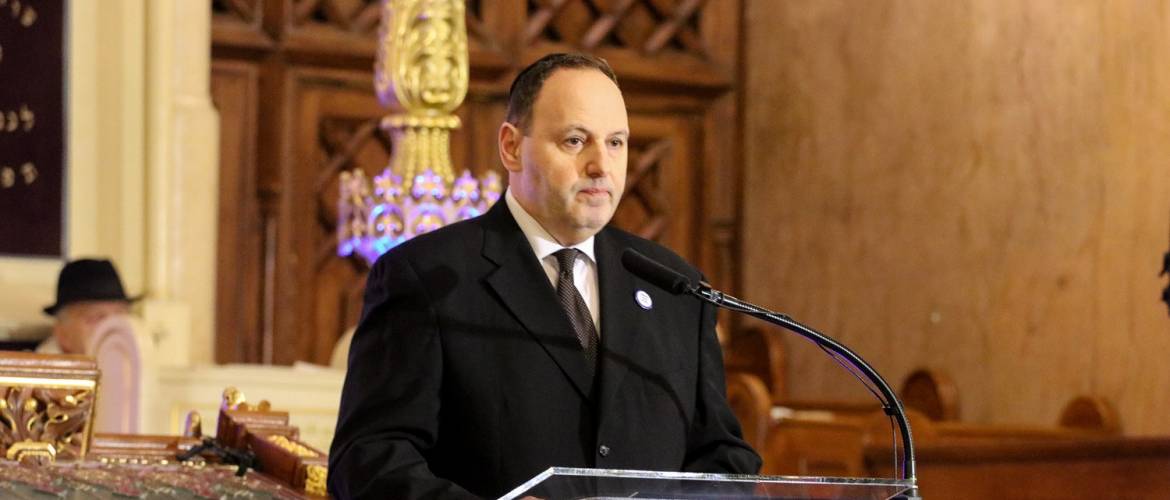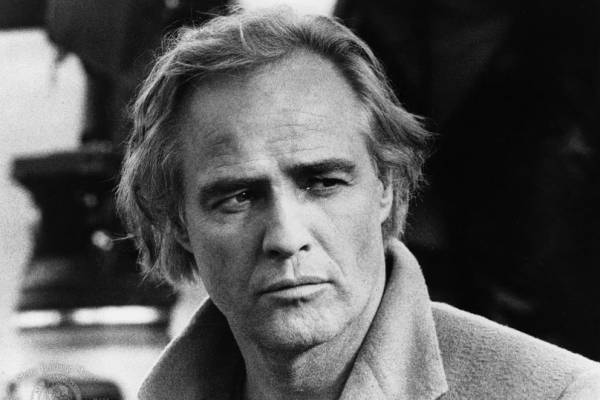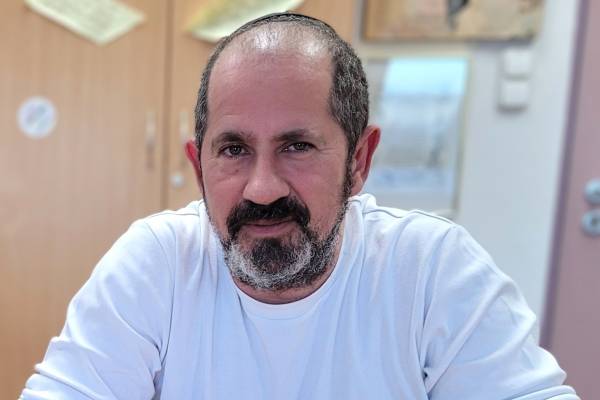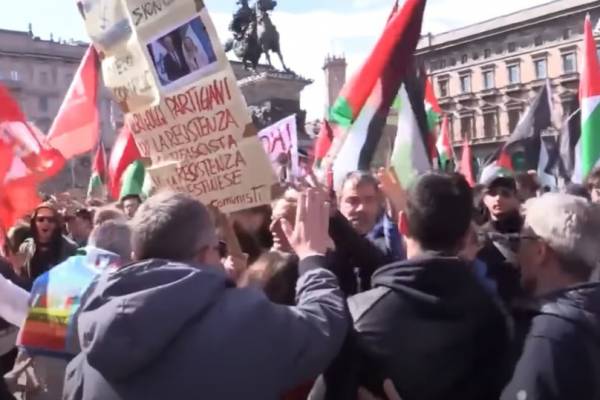On the 79th anniversary of the liberation of the Budapest ghetto,
hundreds of people, including Holocaust survivors, leaders of Jewish
organizations, diplomats, politicians and students, took part in the
commemoration organized in the Dohany Street synagogue. They were addressed by Chief
Rabbi Péter Kardos, Holocaust survivor, and Mester Tamás, president of the
Budapest Jewish Community (BZSH), vice president of Mazsihisz, the Federation
of Hungarian Jewish Communities.
A beautiful, worthy and uplifting event took place at the synagogue on
Dohany Street, where a commemoration was held to mark 18 January 1945, the
liberation of the Budapest ghetto.
The event was attended by dr. Andor Grósz, president of the Federation
of Hungarian Jewish Communities (Mazsihisz); dr. Péter Kunos, managing director
of Mazsihisz-BZSH; Tamás Mester, president of BZSH, vice president of
Mazsihisz; dr. Péter Nógrádi, vice president of Mazsihisz; the rabbis of the Federation,
including dr. National Chief Rabbi Róbert Frölich; György Szabó, president of
Mazsök, the Hungarian Jewish Heritage Public Foundation.
Representatives of diplomatic and political life were present, including
David Pressman, ambassador of the USA; Julia Gross, Ambassador of Germany;
Moran Birman, Deputy Head of Mission of Israel. Several politicians were also
present, including mayor Péter Niedermüller, and deputy mayor Balázs Szűcs from
Budapest district Erzsébetváros. Many young people were present, including some
150 students and several instructors of the BZSH Foreign Trade Technical School,
led by headmaster András Salusinszky
Volinist Zoltán Tordai and his band, as well as cantor Immánuel Zucker
and organist Eszter Ferenczi participated in the commemoration.
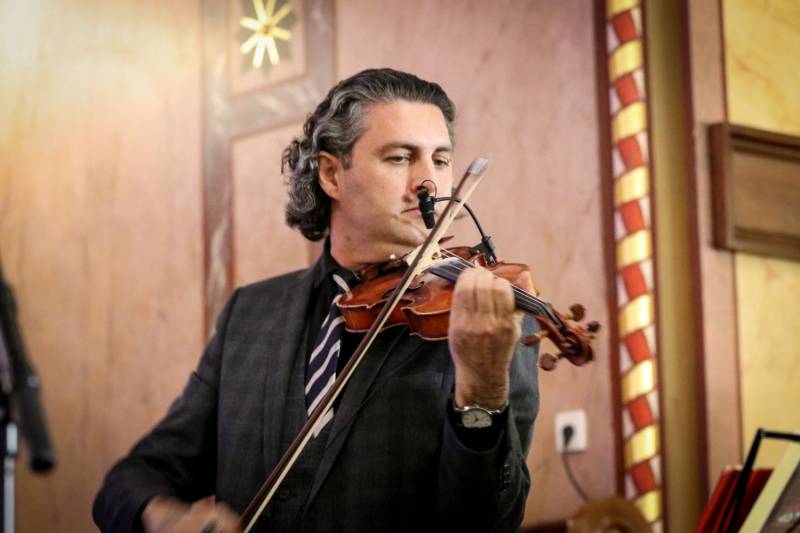 Zoltán Tordai
Zoltán Tordai
The president of the BZSH, the vice-president of Mazsihisz, began his
speech with a historical review, pointing out that the size of the German
Eichmann commando would not have been sufficient to ghettoize and deport the
hundreds of thousands of Hungarian Jews, their activities were greatly helped
by the supportive cooperation of the Hungarian authorities: under the burden of
the German occupation, the Hungarian state delivered its Jewish citizens and
actively participated in the destruction of 600,000 of our brothers in faith.
Our brothers died as martyrs in the hell of Auschwitz and the other
death camps, in the labor service, on the death marches, on the banks of the
Danube, or right here in the Budapest ghetto, said Tamás Mester.
He touched on the processes that led from the entry into force of the
numerus clausus in 1920, through the Jewish laws, to the tragic end, and then
he recalled the history of the Budapest ghetto: on November 29, 1944, the
ghetto was established in Budapest’s seventh district by order of the Arrow-Cross
(Hungarian Fascist Party) Minister of the Interior, Gábor Vajna.
"70,000 to 80,000 people were crammed into the forced accommodation
created to isolate a significant part of the Jews in the capital, which was the
last and largest ghetto in Europe. In addition to the deprivation of all their property
and rights, the Jews of Pest, humiliated to the extreme in their humanity,
deprived of their most basic human needs, fought daily for their lives. They
were constantly starving, the hygiene and health conditions were unbearable,
and as a result of this and the brutal murders of the Arrow Cross gangs, the
Jews died en masse," he emphasized.
Tamás Mester thanked the liberators: "The citizens of Pest,
including the Jewish people still alive in the ghetto, were liberated by the
Soviet Red Army and freed from the mindless Nazi-Arrow Cross rule. Respect and
gratitude to the heroic Red Army soldiers".
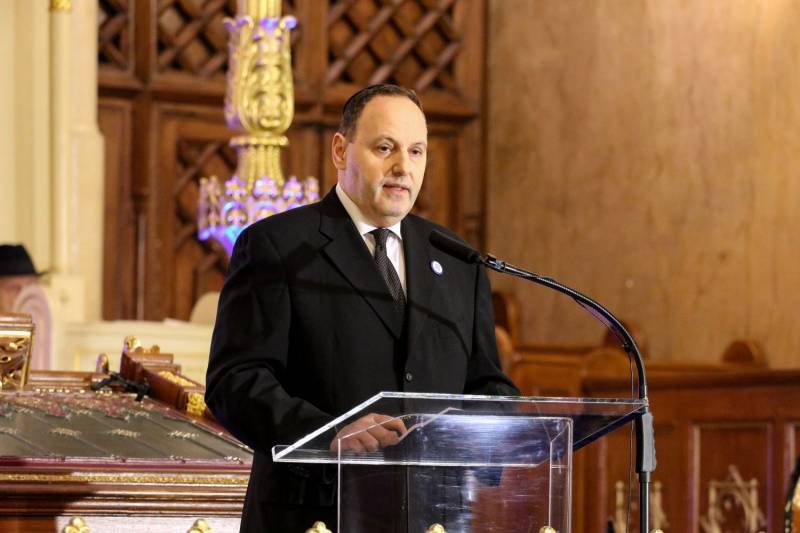 Tamás Mester
Tamás Mester
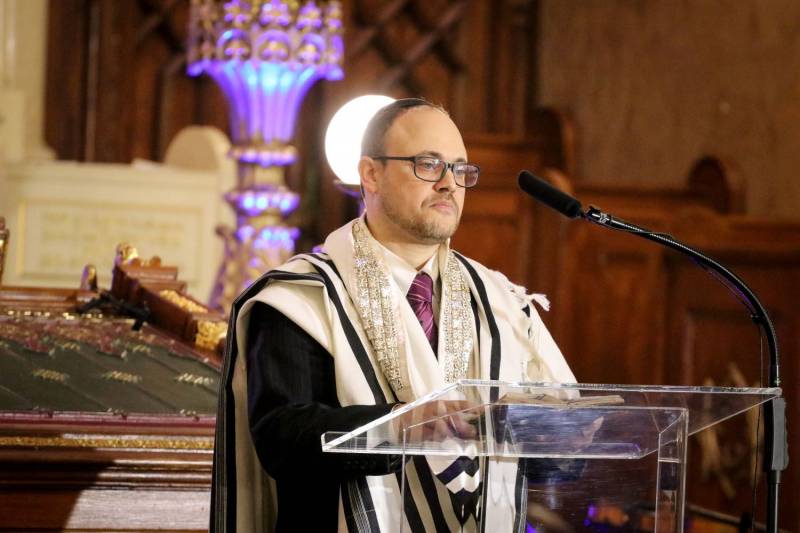 Immanuel Zucker
Immanuel Zucker
He stated that from the perspective of eight decades, the descendants of
the survivors, as well as the domestic and international democratic public,
have other obligations besides the task of commemoration. In this regard, he
quoted the alleged words of General Eisenhower, which were uttered after the
liberation of one of the concentration camps:
"Capture everything, collect the films, collect the witnesses,
because one day the time will come when some bastard will stand up and say that
none of this happened."
He added: unfortunately, Eisenhower's sad prophecy has come true in
certain circles, the denial or relativization of an era of the Shoah is
reaching an increasingly large social base, not only in Central Europe, but
also in the Western world. According to recent surveys, more than a third of
students in the USA and Canada do not believe that there was a Holocaust.
In Hungary, the proportion of those who believe that there were never
gas chambers in the concentration camps is 15 percent, and 21 percent believe
that the Jews invented most of the Holocaust only after the events.
This unfavorable process was tragically reinforced by the "seventh
of October", the bloodshed of the terrorist organization Hamas in Israel.
Tamás Mester elaborated that inexplicably, the tragedy in Israel on 7 October
incited a new wave of anti-Semitism in circles that consider themselves
progressive in the United States and Europe, so it can be seen that - as he put
it - we still have a lot of work to do seventy-nine years after the liberation
of the Budapest ghetto.
Above all, such a task include the remembrance, which cannot be based on
anything else but reality; also, a primary task is to take care of the
survivors who are still among us; recording and documenting the survivors'
narratives; educating and informing about the real and authentic historical
events. Steadfast remembrance of the heroic soldiers of the liberating Soviet
Red Army is an eternal task that cannot be overshadowed by later historical and
current political events.
Tamás Mester concluded his speech by saying: "let us remember with
a silent bow of our heads the martyrs of the Budapest ghetto, our family
members, friends, acquaintances, the civilian victims of the battles in the
capital, the heroic soldiers who fought against Nazism, may their memory be
blessed!".
Péter Kardos: We always believed everything and never believed anything
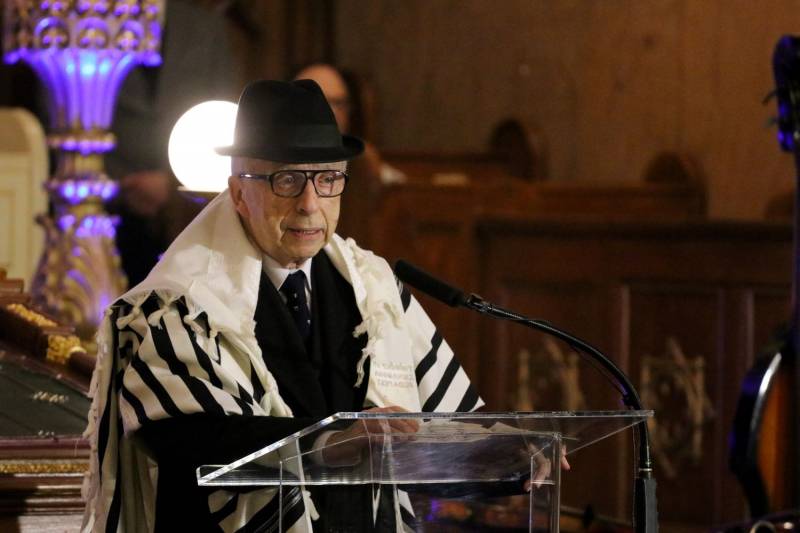 Péter Kardos
Péter Kardos
The mood of the sermon of the chief rabbi, a Holocaust survivor himself,
was set by one of Zoltán Zelk's verses: "We live as long as we live, but
our childhood is more immortal than God". In connection with this, Péter
Kardos said: "I can attest to the truth of the poet's lines". It is
true even if this childhood is spent in the ghetto; if this involves the loss
of father, relatives, friends; if it goes without the toys of childhood; when
playing ball is replaced by collecting bomb shrapnel, the storybook is replaced
by leaflets scattered by airplanes, and meals are replaced by reading food
recipes.
As he explained, in a new era, in the time of "never again",
he should talk about what happened seventy-nine years ago in the ghetto, in the
sheltered houses and on the banks of the Danube, but he refrained from doing
so, because those present had heard it many times, read it in songs and poems,
and seen it in films and in plays.
Then he added emotionally: "I will not talk about the piles of
corpses in Klauzál Square and Kazinczy Street, about the hunger, the cruel
cold, about the first Soviet soldier, about the piece of bread received from
him that meant life, I will not talk about the sight of the evening muzzle
flashes that we perceived as the light of hope, about what an eight-year-old
child saw and heard".
Péter Kardos emphasized: those who think that almost eight decades is
enough time to objectively judge what happened then are right, and this is true
even from the point of view of the few still surviving ones. He then asked the
question: what does "objectivity" mean? He continued saying: "we
survivors cannot be objective. We can only be biased and subjective. Biased
because we were the suffering part of the story, we are subjective because we
keep in our memories those who died by our side or lost their lives for our
liberation.”
The chief rabbi stated that the starting point is that "it is
confirmed by our entire history, and that is why we have taken this upon
ourselves, Asire Hatikva, we are the prisoners of hope. And if we are, then
let's declare that we have always believed everything and never believed
anything!" Péter Kardos elaborated:
"We believed what the great powers declared after the World War: no
more war! What do we experience? You know this. We thought we were Hungarians.
We experienced eighty years ago that we are not! We thought they were taking us
to work. We experienced that they were taken to the ghetto or Auschwitz".
In his sermon, he touched on the fact that "forgetting is sometimes
a positive characteristic of a person, but God does everything to ensure NOT TO
FORGET! his commandment should not be forgotten, and as the decades pass, man's
stimulus threshold will become higher and higher, and therefore the stimulus
threshold of his creature can only be reached with an increasingly shocking
event or spectacle. After the Shoah, swastikas or arrow crosses on the wall,
later comes the questioning that the Holocaust happened, then comes the covid
epidemic with curfews and shopping time slots, as it happened THEN". He
continued: "and when we thought that this could not be increased , we have
seen that it is possible. It seems that God's methodology is inexhaustible
about DON’T FORGET! After all, on October 7th, a terrorist attack hit Israel,
which is an unparalleled tragedy of the post-Shoah era: so many Jews have not
been murdered since the Holocaust - in a few hours. God won't let us forget!".
Péter Kardos called the anti-Semitic wave that is now dominating the
world unprecedented, and as he noted: the NO is also unprecedented. But the
DON'T FORGET! this also fits into his methodology. We are prisoners of hope! Or
were we? This is the question of questions in the "never again" era.
Then what can we trust, what can we hope for today?
The rabbi's answer: hope, which, according to the saying, dies last,
seems dying. In this situation, prayer should come, but not mechanically
muttered prayer, but a plea to the Lord of Heaven that rises from the depths of
the heart and soul.
At the end of the event, the commemorators lit candles at the Emanuel
memorial tree, and the event ended with the laying of wreaths on the liberation
memorial plaque in Wesselényi Street.
Photos: Ákos Szentgyörgyi

 05.17. 19:58, kimenete: 05.18. 21:14
05.17. 19:58, kimenete: 05.18. 21:14 


